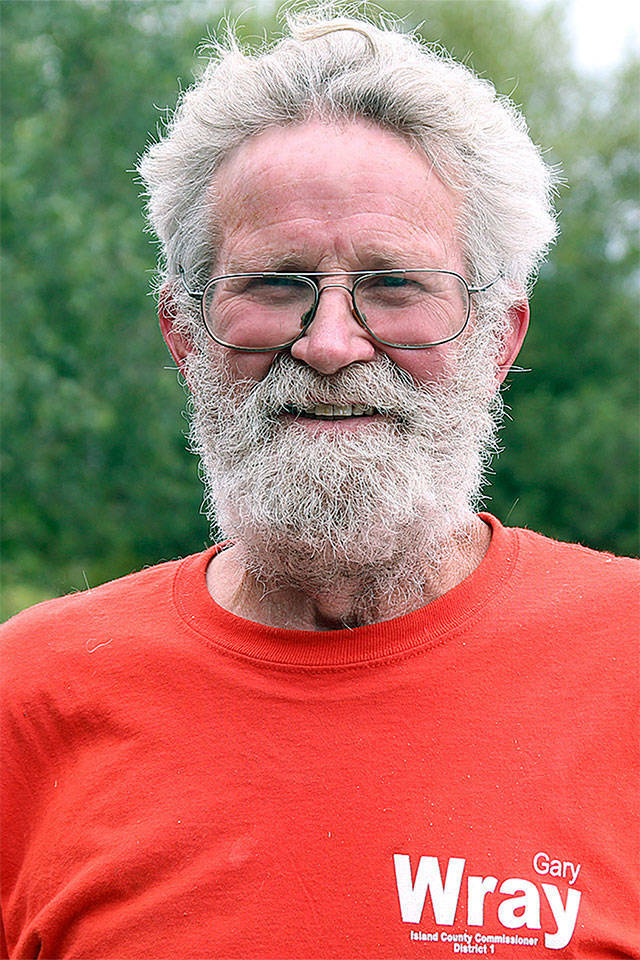The race for Legislative District 10, position 2, is in the final stretch.
In the primary, incumbent Rep. Dave Paul, an Oak Harbor Democrat, came out on top of his Republican challenger, Gary Wray of Coupeville. Paul earned 55.5% of the vote and Wray received 44.4%.
Paul, director of community relations at Skagit Valley College, has taught higher education for over 25 years. He’s focused on reducing the costs of higher education and health care, improving mental health, funding and electrifying the ferry system, supporting veterans, providing more resources to first responders and providing tax relief. If elected, this would be Paul’s fourth term.
Wray owns and operates Laser Construction and Development, a siding subcontractor. He is a Navy veteran with six years of service as a reactor operator on a nuclear submarine. He’s been involved in promoting the building industry for years and is a leader in charitable causes on Whidbey Island.
This is a key difference between the two campaigns, Wray said. Paul has worked in the government sector “for life,” and Wray has worked in the private sector.
“I’ve talked to him a lot,” Wray said. “He has no concept of business. He’s always been in the government.”
Wray said Olympia is broken. One party rules, and that party doesn’t include non-majority party Democrats or Republicans. Wray’s focuses include broadening parental rights, increasing the police force and lowering the cost of living. He plans to bring the perspective of a small business owner and builder to the legislature.
Paul said District 10 is moderate and needs leaders able to find practical and bipartisan solutions. As the nation becomes more polarized, he said he is proud to be able to work “across the aisle.”
Wray similarly values this approach, noting his work with the nonprofit Civility First that works toward bridging political divides in communities.
In the 2024 legislative session, Paul’s House Bill 1316 allowed high school juniors and seniors to enroll in tuition-free community college classes in the summer, making college more affordable. His other efforts included lowering the costs of health care and prescription drugs, protecting access to reproductive care and supporting the LGBTQ+ community. House Bill 1979, which reduces the costs of asthma inhalers and EpiPens, was passed unanimously.
For the 2025 legislative session, Paul is focused on addressing behavioral health treatment, constructing more treatment facilities and supportive housing for those who are homeless. He’s also working to strengthen K-12 workforce training programs.
Wray said Paul’s support of House Bill 1589, which provides planning mechanisms to ensure Puget Sound Energy has 80% non-emitting resources by 2030 and 100% by 2045, is what inspired him to run.
Paul opposes all four initiatives on the November ballot, Wray said, including Initiative 2066 which would repeal or prohibit certain laws and regulations that discourage natural gas use.
“To me, (Paul) is lost,” Wray said. “He’s parroting the Democrats’ voice or the majority party in Olympia, and he’s bringing it home and telling the people this is what we need to do. I would do the opposite. I would be listening to the business here and taking that to Olympia and pushing what the citizens want, not what comes out of Olympia.”
As vice chair of the transportation committee, Paul said he will continue working to improve the ferry service.
“For years, our state has not made the investments needed in our ferry system — until it is in crisis,” Paul wrote in an email. “Our state has twice gone a decade without building a new ferry, and our state failed to prepare for the wave of retirements we’ve seen over the last four years. This is unacceptable.”
The first three hybrid electric ferries are set to be in service by 2028, he said. Paul plans to fund an additional ferry every biennial budget to ensure that a new ferry “is coming online” every two years and prevent a hiatus in transportation services.
According to Wray, this 2028 projection is not feasible.
“(The technology) doesn’t exist in the world today,” he said. “They might tell you it does. The Scandinavian countries have the most experience with them, and their ferries are tiny compared to ours.”
Wray proposes designing the new ferries with diesel engines with the intent of hybrid or electric conversion when the technology exists.
“That’s why I say (Paul is) kind of parroting out of Olympia, because there is a push in Olympia to make the ferries all hybrid,” he said. “I don’t think we’ll see the hybrid electric ones until well after (2028), and we need the boats right now.”
Through the New Mate Scholar and Able-Bodied Sailors to Licensed Deck Officers programs, Paul said he has worked to improve the recruitment of ferry personnel. He’s quickened the pace of ferry maintenance and restored $49 million in cuts to the ferry system that was proposed in the 2024 governor’s budget.
His eyes are also set on providing state agencies tools to hold insurance companies and providers accountable.
“I’m very frustrated with the increase of surprise medical billing despite our state’s efforts to eliminate this harmful practice,” he said.
Ballots will be mailed to registered voters on Oct. 17.




